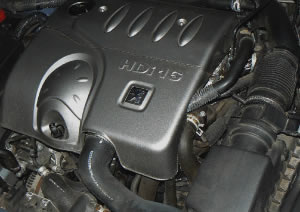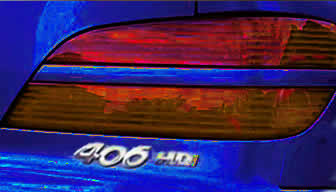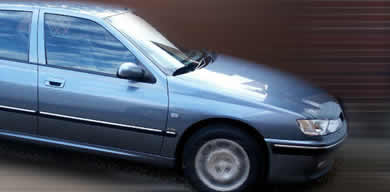Tuning diesels for maximum power and torque
"Doctored Diesels"
 From a diesel perspective, anything that isn't turbocharged is a waste of time from a tuning point of view. Similarly, anything that isn't using electronically managed direct injection is a pointless tuning proposal so we are somewhat limited to modern Turbo Diesels.
From a diesel perspective, anything that isn't turbocharged is a waste of time from a tuning point of view. Similarly, anything that isn't using electronically managed direct injection is a pointless tuning proposal so we are somewhat limited to modern Turbo Diesels.
Get rid of those two ointment bound flies and things get more interesting. A 2001 plated Peugeot 406 2.2HDi has been re-mapped from factory spec 136bhp (it's pretty good in that tune with 235lbft to play with!) to a whopping 192bhp@4150rpm and 329lbft (yes, that's right, we have NOT confused Nm with lbft) delivered from 2250rpm.
This endows the car with mid-range thump that wouldn't disgrace a Boxster or Audi TT with the silly engine option. NO stopwatch necessary, this is a genuinely rapid car now, it both feels quick and achieves the numbers to be quick.
All the anti-diesel folks will bang on about 0-60. Well, (TorqueCars member) HDIfun has never put a stopwatch on it in anger but says "you can do it in well under 8 seconds without going over 3500rpm! In gear acceleration is a bit of a giggle too - 50 to 70 in FOURTH in about 2.5 seconds!! 70 to 90 in fifth in under 6!!! Flat out, who cares, the factory spec is said to be good for 129mph."
Go figure for yourselves - and then reckon into the equation over 35mpg when driven in anger. A powerful turbo diesel is perfect for the half grown up driver, and, boy will you lurrve that sheer muscle. It the sensible and fun choice.
Everyone who has driven a current 330d or a 535d will likely agree that they are disgustingly rapid from the factory. These engines can still be made to deliver more torque, but you have to question if it's really necessary given the ease with which they both fling themselves foward in response to a gentle squeezing of the right toes
Some assert that manufacturers modestly undertune the current crop of performance diesels in order to create a place in the market for their petrol powered models. In the case of the Golf GT tdi I've still to meet anyone who doesn't exceed the standard manufacturers acceleration claims by a whole second. For some folks, only petrol will do.
Curiously, in my estimation these are of the older generation who will not even test drive a diesel car because 'they're slow and noisy, aren't they?'. Just look how many current model Micras are being driven around with Nissan's excellent but spineless small capacity 4 cylinder petrol units. Try the dCi 82, for example. It handles like a go-kart and accelerates absolutely beautifully. It would suit your dad perfectly.
 Induction kits and exhaust should theoretically offer a slight increase in power as you still require an efficient delivery of lots of cold air and a way to expel them as efficiently as possible. The bore size of Diesel exhausts is typically much larger than a similar powered petrol car especially on Turbo Diesel models. Initially I would recommend just adding a good quality (washable) high flow panel air filter to the standard air box.
Induction kits and exhaust should theoretically offer a slight increase in power as you still require an efficient delivery of lots of cold air and a way to expel them as efficiently as possible. The bore size of Diesel exhausts is typically much larger than a similar powered petrol car especially on Turbo Diesel models. Initially I would recommend just adding a good quality (washable) high flow panel air filter to the standard air box.
As for internal mods for sophisticated diesel engines, typically the rewards obey the law of diminishing returns. With forced induction there's only so far you can go with cam/valve lift and air (gas) flow. Especially with a diesel engine, given the limited rev range there's not that much reward from tuning a head in the traditional way. Diesel burns very slowly (hence the 4000rpm peak BHP most achieve, even if they will spin to over 5000rpm).
Getting the flame front inside the combustion chamber to accelerate faster than the piston crown is the only real option, and this is to some degree achieved by allow small amount of fuel to be injected during the expansion phase of the engine's cycle.Too much of this and you get smoke and soot, and burn a load of fuel. Increasing the BMEP (brake mean effective pressure) by means such as increased boost can assist. This, too, is a double edged sword as the biggest fraction of the atmosphere is nitrogen, which, although good for cooling, is still incombustible.
 That's where nitrous comes in, in the same way it does in a petrol powered vehicle. The gains achieved in this way can be absolutely silly, but given the cost and legal position with regard to road usage it's a bit of a white elephant.
That's where nitrous comes in, in the same way it does in a petrol powered vehicle. The gains achieved in this way can be absolutely silly, but given the cost and legal position with regard to road usage it's a bit of a white elephant.
Increasing the cetane rating of diesel fuel is quite effective in increasing the release of 'free' power. With a diesel engine, the key is getting the fuel to burn more rapidly, as opposed to a petrol engine where octane number is God. Higher octane petrol fuels burn more slowly and resist pre-ignition better than low octane fuels. Pre warming the fuel and direct injection into the combustion chamber all help to improve the speed and efficiency of combustion.
Good results can be obtained with cetane improvers. Sadly, these can prove expensive and should not be used in engines that are Euro Iv (2004) compliant. Strangely, the 2.2HDi 2001 model is 2004 compliant. The particle filter ( a whole subject in itself) can become blocked or excessively obstructed by use of such products.
Weight reduction is very very sensible. Not only does less weight mean better performance for free, it also puts less load on tyres, which allows braking and handling to be optimised. It also reduces the load on the environment as less fuel is required, thereby the release of exhaust gases is reduced.
Downsides of Diesels:
Engine mass/weight is a standard problem with diesel cars (especially FWD ones). That heavy engine can upset the handling balance of a car. Diesel units are heavy; they're dealing with big compression ratios and big torque figures. As such, the bearings are larger in diameter, the gearboxes belong in lorries and tractors even if the change quality is good.
Clutches are getting on for 12" diameter and require fluid operation and servo assistance to make the things pleasant to drive, often a standard clutch will suffer from slip when a remap yields a massive torque figure so you may need to uprate the clutch.
We now have a dedicated diesel forum where you will meet our resident diesel enthusiasts and discuss tuning options for your car.
If you liked this page please share it with your friends, drop a link to it in your favourite forum or use the bookmarking options to save it to your social media profile.
Check out TorqueCars new YouTube channel, and see their awesome new content...
Feedback
Please use our forums if you wish to ask a tuning question, and please note we do not sell parts or services, we are just an online magazine.
Help us improve, leave a suggestion or tip
